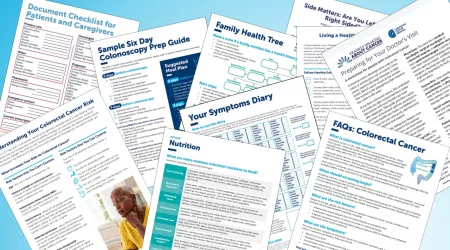African Americans and Colorectal Cancer

Risk for African Americans
Colorectal cancer (CRC) is the third most common cancer in black men and women. African Americans are also diagnosed with CRC and young-onset CRC more often than members of other communities in the US. Colorectal cancer can be prevented through screening and is treatable when caught early.
Generally, African Americans are at higher risk for cancer than other racial or ethnic groups in the US.
More than one in three will be diagnosed with cancer in their lifetime.
COMMON SYMPTOMS
Colorectal cancer first develops with few, if any, symptoms. If symptoms are present, they may include:
A change in bowel habits: These include diarrhea, constipation, a change in the consistency of your stool, or finding that your stools are narrower than usual
Ongoing stomach pains: Such as those from cramps, gas, pain, the feeling of being full or bloated, or that your bowel does not empty completely
Rectal bleeding: Blood (either bright red or very dark) in your stool
Weakness or fatigue: These may be in addition to unexplained weight loss, nausea, or vomiting
Colorectal cancer can develop without symptoms. That’s why on-time screening is critical. Learn more at GetScreened.org.
STAGES OF DIAGNOSIS
Colorectal cancer is 90% beatable when caught early through screening. Once cancer has spread, it becomes much more difficult to treat. Nearly one-in-four colorectal cancer cases in African Americans are diagnosed at stages when it is harder to treat. If you have symptoms, speak with a medical provider immediately.

PREVENTION
GET SCREENED
Colorectal cancer can easily be prevented through screening. Colon cancer and rectal cancer are also highly treatable if caught early. All African Americans should have screening tests starting at age 45. Screening tests can be completed in a clinical setting or at home. Talk to a doctor about what’s right for you. Learn more at GetScreened.org.
FAMILY HISTORY
Most people with colorectal cancer do not have a family history of the disease. But some families have more cancer than we would expect. This suggests a genetic and/or hereditary factor. You are at increased risk if one immediate family member (parent or sibling) or multiple relatives have colorectal cancer or polyps—abnormal growths in the colon or rectum. Talk with your family about their medical history so you can take control of your health. If you’re at increased risk, please talk with a doctor about how and when you should be screened.
LIVE A HEALTHY LIFESTYLE
Beyond screening, there are many things you can do to live a healthy colon lifestyle. Know your risk factors and family history. Most importantly, listen to your body. If something doesn’t feel right or changes, take control and speak to your doctor. Pre-existing conditions that increase risk of colorectal cancer include type 2 diabetes, obesity, inherited syndromes including Lynch, and inflammatory bowel disease.
Tips for a healthier colon:
- Eat fiber (fruits and vegetables)
- Drink plenty of water
- Take in whole grains
- Drink low-fat or fat-free milk
- Eat lean proteins (chicken, turkey) instead of processed meats (hot dogs, lunch meat)
- Reduce excess sugar and fried foods
- Limit alcohol intake
- Maintain a healthy weight
- Don’t smoke
- Exercise regularly
- Monitor bathroom habits for any changes
Top resources

Colorectal cancer resources for learning and sharing
Whether personally impacted by colorectal cancer (CRC), supporting a loved one, or dedicated to educating and empowering others, these downloadable and printable resources can help.

Don Shippey: from stage IV to six years cancer-free after receiving HAI pump
Don Shippey was 55 years old in 2016 when he decided he’d been putting off his colonoscopy long enough.

Study identifies early indicators of young-onset CRC
These red flags could aid in the detection and diagnosis of colorectal cancer among younger adults, as the incidence of this disease in young people has nearly doubled in recent years.





